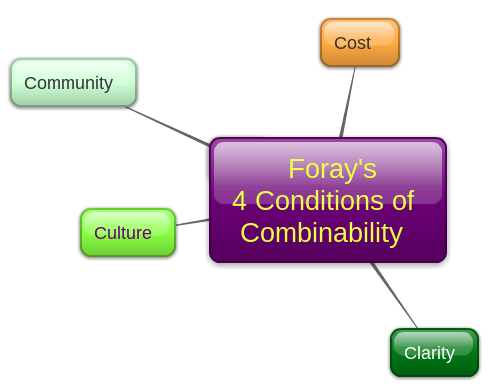Participating in an online community~Week 5 Post 2
Disclaimer: This post is part of course requirements following this assignment: Extend your identity in the direction of your career path and participate in a new online community. Interact online using your projected identity for at least six weeks. Think deeply about identity and learning and blog twice a week about your experience. Take time to analyze the meaning, power, and constraints of the community on your learning.
~~~~
Week 5, Post 2
The 4 C’s of Community Combinability
The principle of combinabilty and shared knowledge enhance online communities, especially the community to which I belong, The Science Fiction and Fantasy group on Goodreads. The word combinability is so novel that it still sparks the SpellCheck red underline. But it is also featured in Clay Shirkey’s Cognitive Surplus and his description of Dominique Foray’s research.
Our book community meets entirely online. We have a clarity of shared purpose, hobby, and goal to read science fiction and fantasy books. This is an essential component of our culture. The cost is free, predicated only by the cost of the books we purchased for our Kindles or bookshelves. The facility of communication and convergence of the Science Fiction and Fantasy group is aided by the catalyst effect of the increased comfort to which people in online communities have grown accustomed. Our culture has been altered, whether positively or negatively depends on each individual’s experience.
Clay Shirkey writes in his book Cognitive Surplus that the first social networking website was not Facebook or Friendster but a site called Six Degrees. According to Shirkey, Six Degrees “failed because in 1996 not enough people were comfortable living their social lives online” (193). At the same time, the emotional distance fostered by Facebook and other sites can encourage a healthier candor, too. Seventeen years later, not only do we feel comfortable sharing online, many of us feeling comfortable oversharing!
Nicholas Carr warns of the “Web’s info-thickets” of information that requires us to scan and skim and skip lightly across miles of hyperlinks. Across those thickets, not all is inclusive and accommodating to Foray’s combinability theory.
Teacher, Andrew Simmons writes about the changes he has seen in his students’ writing, “It’s a really bad neighborhood. On Facebook and Twitter, students humiliate, jeer, and shame one another. They engage in antisocial, even criminal behavior—leaving belligerently racist comments on links, harassing classmates with derogatory posts.”
Things are far more civil in my online book community, but within our online culture, there are cultural differences corresponding to our different countries. Several folks in my online communities are taciturn in their responses which they attribute to their disinclination to share everything. Some of us are over-eager to traverse participation circles as described by Etienne Wenger and share with a fluency of what I’ve labeled the 3 R’s of Combinability: responses, recommendations, reports. Protected by my identity and closed profile, I enjoy a bookish version of anonymity.
- Johan* notes that his posts are abbreviated because he has a limited amount of time online because he is late to the library where he must connect.
- Trianna* writes that she does not have access to Kindle books since they have not been translated into her native language.
- John* explains that he was especially sensitive to spoilers during the Harry Potter book roll-out because the sequels came out later than in the Potter’s U.K.’s home country.
Whether it is Wenger’s invitation to Communities of Practice, Foray’s Combinability Theory, or Shirkey’s fulcrum toward our cognitive convergence, the Internet is the catalyst that Carr describes:
“For me, as for others, the Net is becoming a universal medium, the conduit for most of the information that flows through my eyes and ears and into my mind.”
~~~
*=name aliases
Article Sources:
Carr, N. (2008). Is google making us stupid?. The Atlantic, Retrieved from http://www.theatlantic.com/magazine/archive/2008/07/is-google-making-us-stupid/306868/
Simmons, A. (2013). Facebook has transformed my students’ writing—for the better. The Atlantic, Retrieved from http://www.theatlantic.com/education/archive/2013/11/facebook-has-transformed-my-students-writing-for-the-better/281563/
Book Sources:
Shirkey, Clay. (2010). Cognitive Surplus How Technology Makes Consumers Into Collaborators. Penguin Books.
Wenger, E. (1998). Communities of practice, learning, meaning, and identity. (1st ed. ed.). Cambridge University Press.
I created the Foray mindmap at Bubbl.us


 Advanced Care Directives
Advanced Care Directives









